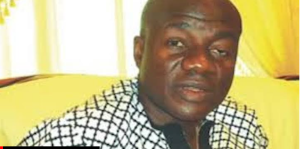The political storm in Rivers State may have been papered over, but questions around President Bola Tinubu’s controversial state of emergency declaration continue to stir national debate. Now, Tony Okocha, Chairman of the All Progressives Congress (APC) caretaker committee in the state, has weighed in—describing the move as a “necessary evil” that allegedly saved Rivers from total collapse.
But beneath Okocha’s carefully curated narrative lies a troubling indifference to constitutional boundaries, due process, and the fragile state of Nigeria’s democratic institutions.
Crisis “Solved” or Constitution Trampled?

Speaking at the APC national secretariat in Abuja during a thank-you visit to the party’s National Working Committee, Okocha declared that Tinubu’s actions—suspending a sitting governor, his deputy, and elected lawmakers, and installing a retired military officer as administrator—had resolved “90 percent” of the state’s political problems.
“It was like a hernia that needed surgery. Painful, yes, but necessary,” Okocha said, likening the drastic move to a medical emergency.
That analogy may sound poetic, but the legal and democratic implications of a president unilaterally suspending elected officials and installing a military appointee remain severe and largely unaddressed.
Red Pens and Red Flags
Okocha dismissed criticism of the state of emergency, accusing Governor Sim Fubara of being “hydra-headed,” ungrateful, and too politically ambitious for his own good. He mocked Fubara’s symbolic use of his gubernatorial “red pen” in a viral moment, suggesting that the governor had become delusional about the extent of his power.
“I don’t know whether the red pen has dried up now, or maybe it will dry up before six months,” Okocha quipped.
But is that really the level of political analysis expected from a state party leader? Critics argue that such taunting rhetoric masks a deeper problem—a disturbing trend of political actors justifying constitutional breaches in the name of “peace.”
Exonerating Wike, Ignoring Power Dynamics
Despite widespread belief that former Governor and current FCT Minister Nyesom Wike is at the heart of Rivers’ political tug-of-war, Okocha attempted to absolve him of any blame.
“Was he in the fray? The answer is no,” Okocha said, before admitting that Wike’s political machinery produced the assembly members and Fubara himself.
In one breath, Wike is absent; in the next, he is the architect of the state’s political structure. This double-speak raises serious questions: If Wike holds so much sway, then how is he not central to the chaos?
Constitutional Oversight or Political Muscle?
The APC chieftain welcomed the lawsuit filed by PDP governors challenging Tinubu’s declaration, stating that a Supreme Court verdict would be helpful in setting precedent. But his tone suggested more confidence in executive muscle than in judicial clarity.
“Thank God they are going to the Supreme Court. Let’s see how it enriches the respondents,” he said, brushing aside the Nigerian Bar Association’s concerns about the legality of suspending elected officials.
This casual dismissal of legitimate constitutional concern highlights a broader attitude that sees the rule of law as optional when political power is at stake.
Is the Emergency Over, or Just Beginning?
While Okocha claims the state of emergency ended lawlessness in Rivers, civil society organisations, legal experts, and opposition voices see something more ominous: a creeping normalization of executive overreach, veiled under the guise of peacekeeping.
If political stability must come at the cost of democratic legitimacy, what message does that send to other states—and the Nigerian people?
